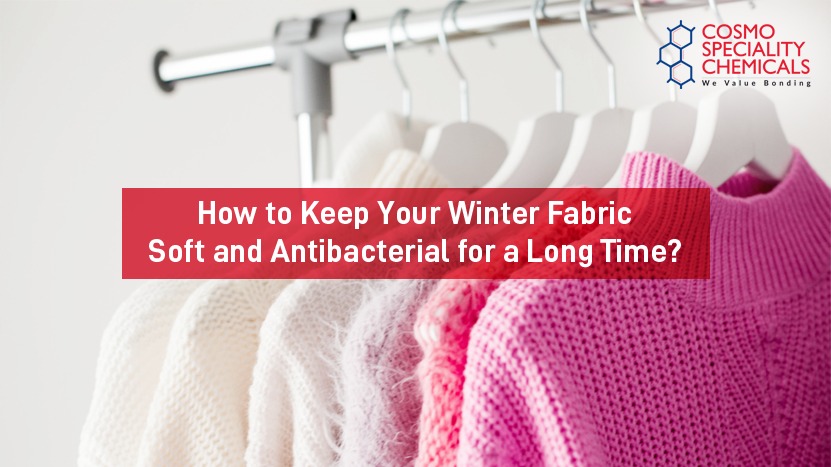
How to Keep Your Winter Fabric Soft and Antibacterial for a Long Time?
The winter fabric industry especially welcomes the onset of winters. By the end of November, the demand for winter clothing starts to see a jump. But the inventory needs special care and handling to be continuously demanded by the end-users and survive the supply chain.
Winter fabrics need extra care to remain soft. Also, recent viruses like Covid-19 have proved that there is an urgent need for fabrics to have anti-bacterial and anti-viral properties as well. But, being a manufacturer, how can you cater to these needs? Here is how.
The basics of textile manufacturing
The science behind textile processing is one of the essential steps in the manufacturing process. It plays a crucial role when it comes to maintain winter fabrics.
To understand the core of winter fabric care, we shall first understand the basics of textile manufacturing.
Textiles are woven or non-woven materials made from natural or synthetic fibers. The application determines the textile properties to be created-like elasticity, high-temperature stability, biodegradability, or waterproofness.
In response to rising public awareness of infectious diseases, the textile industry and scientists have created hygienic fabrics by incorporating various anti-microbial and anti-viral compounds.
The specialized treatment of textile primarily entails sequentially processing the fabric through the pretreatment, dyeing, and finishing phases.
Pretreatment prepares the textile for dyeing, whereas dyeing involves dyes and auxiliaries to provide the fabric's color, pattern, and colorfastness. Finishing is the final step in textile processing that adds value.
The market is swamped with textile finishing chemicals. Some of them are harsh to the fabric, which harms the fabric in the long run.
To improve the product value and appeal, textile manufacturers treat the fabrics with Antibacterial & Antiviral finishing agents and fabric softeners. These finishing chemicals ensure the safety of consumers from harmful diseases and keeps the fabric soft, thereby increasing the value and the applications.
What are fabric softeners, and what do they do?
Fabric softeners are finishing chemicals. Textiles treated with finishing chemicals create desired outcomes and provide practical and aesthetic benefits. The finishing process can change the appearance of the fabric, making it soft, smooth, and vibrant.
There are numerous benefits of using Fabric Softener at the textile processing stage; some of them are listed below:
- Fabric softeners soften and smoothen textile substrates and fabrics, improving tear strength and color shade.
- Using eco-friendly fabric softeners results in moisture management and increased tear resistance.
- Softening agents are lubricants that allow the fiber to slide within the fabric structure, making creasing and deformation easier.
- Softeners primarily affect the surface of fabrics. Small softener molecules penetrate the fiber, forming a polymer through internal plasticization, in addition to allowing the fiber to breathe. This implies that if the manufacturers use the right kind of fabric softener, it will automatically improve the fabrics' overall appearance and texture, allowing them to stay healthy for a long time.
Fabric softeners are an essential component of textile finishing. The physical properties, substrate type, and application methods are the most important factors to consider while buying fabric softeners.
Finishing chemicals by Cosmo Speciality Chemicals
Fabric Softeners
Cosmo Speciality Chemicals produces Hanatex Soft HL, a hydrophilic silicone softener for knitted and woven cotton terry towels. Silicone-based softeners are insoluble in water and must be applied to fabrics after emulsifying and dissolving organic solvents. They are simple to clean and provide smooth hand lubrication and a moderately waterproof surface.
Hanatex Soft HL has excellent sew ability, elastic resilience, and crease recovery properties. They are long-lasting and stable at high temperatures.
Anti-bacterial and Anti-viral Finishing Agents
Another vital part of textile processing is Antibacterial & Antiviral finishing agents.
Anti-bacterial agents give the fabric an invisible and long-lasting anti-microbial and anti-viral effect that effectively prevents the growth of bacteria, mold/mildew, algae, protects against microbial deterioration, discoloration, and odor.
Cosmotex AVB is one such finishing agent manufactured by Cosmo Speciality Chemicals. It is effective against Corona Virus and gives an invisible & durable anti-microbial and anti-viral effect to textile post-treatment. It also provides anti-static properties to the surface and effectively inhibits the growth of bacteria, Mold / Mildew and algae. Being a non-leachable anti-viral and anti-bacterial product, it is highly durable. It is Eco-friendly and non-toxic, hence is safe for humans.
At Cosmo Speciality Chemicals, we aim to produce high-quality finishing chemicals that keep your winter fabric soft and anti-bacterial for a long time. We have a well-balanced product range of proven auxiliaries and unique and innovative solutions.
Our products are customized to be low foaming. Hence, they reduce the load on the environment treatment plant. Cosmo's Finishing Chemicals are eco-friendly and non-toxic. Being based on sustainability and innovation, our products are economical and produce effective results even when used in low quantities.
If you are looking for pre-treatment, dyeing and finishing auxiliaries for your textiles, we can help you. Get in touch with us to know more!
